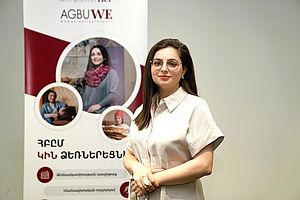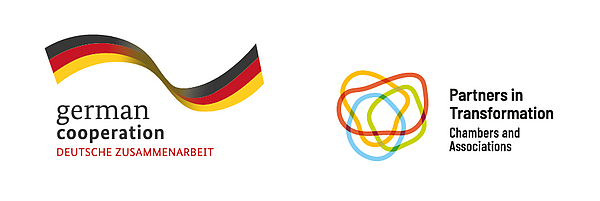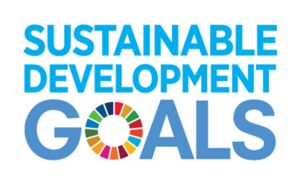Transforming Lives: Empowering Women in Armenia through transformative Business Education

January 2024
Founded in 2017, AGBU Women Entrepreneurs Program (WE) offers women looking to start up or scale up a micro-enterprise or small business with a full cycle of support, including coursework in entrepreneurism and financial management, business marketing, mentorships, courses on local tax legislation, mini-grants and English language coaching. In addition, AGBU WE provides extensive post-program follow up, counselling and alumni engagement, ensuring the creation of a true network of women supporting women. Since 2022, the Program has been collaborating with Deutsche Sparkassenstiftung für Internationale Kooperation (DSIK), incorporating the Micro Business Game (MBG) Simulation training into the course. The MBG training provides experience and learning outcomes on management of small business and financial literacy in an innovative and engaging way.
Among the inspiring entrepreneurs is 58-year-old Shamam, who established Shamam’s Macarons bakery with the help and knowledge gained through AGBU WE Program. Not just a local favourite in Vanadzor, its reputation extends beyond town. Many tourists visiting this city are eager to try the delightfully crafted macarons and croissants.
Empowering Women in Armenia
According to Tatevik Manukyan, AGBU WE Program manager, gender inequality remains a pertinent issue globally, including in Armenia. Women encounter fewer opportunities and more obstacles than men in education and career development. In Armenia, many women do not own property, have bank accounts, or possess cards, even though they have promising business ideas that go beyond traditional roles. Consequently, they face a general lack of access to finance and funding.
"Our goal is to empower women to achieve economic independence by equipping them with the knowledge and tools to start or enhance their own businesses," explains Tatevik Manukyan, outlining the core mission of the AGBU WE Program.
Over the past seven years, approximately 1,000 women have participated in the Program. Many graduates now own businesses, offer employment to others, contribute to community development, and influence economic growth. A survey conducted by AGBU WE indicates an impressive 70-80% success rate, highlighting the graduates have achieved their entrepreneurial goals.
A notable aspect of the Program is its inclusivity: participants must be 18 or older, with no upper limit. The primary criterion is having a feasible business idea. For scale-up businesses, it is important to demonstrate their potential for development and sustainability.
A Full Cycle of Support
Through Workplace Fundamentals, Business course, Handholding and Alumni network, AGBU WE offers a 360 degree cycle of support to educate and empower women to develop strong business plans with the agility to pivot as needed and lean in to the network of Empower Her alumni and supporters around the world.
The Workplace Fundamentals course involves prerecorded video materials on computer literacy, marketing, taxation, financial indicators, pitching skills, etc. The selected Program participants take the Workplace Fundamentals to develop and enhance their soft skills, to make their future participation in the Program smoother and more efficient.
The selected Program participants take a 3-month business course enriched with lectures and interactive tasks to gain basic knowledge in entrepreneurship: marketing, taxation, negotiations, sales, exporting, etc. The participants learn the basics of business plan creation, have an opportunity to submit it, and receive detailed feedback from the business consulting company. During this stage, participants actively integrate skills and materials obtained through training, including the implementation of the Micro Business Game Simulation Training from DSIK. MBG training serves as a unique platform for deepening financial and business decision-making and applying it in real-life scenarios. This includes understanding production processes, working with vendors and analyzing own business figures and performance in an interactive simulation format.
“DSIK appeared in our lives at an important time and equipped us with new tools that helped to add another value to our Program. For most people, it is easier to absorb information during an authentic simulation game. The MBG is interesting, easy, and people immediately get immersed in the process”, says Tatevik Manukyan.
Upon successful completion of the training program, Participants, who overcome the set threshold, have an opportunity to present their business programs to the selection committee during the pitch battle to compete for AGBU WE’s grants - the chance of receiving financial support from AGBU. Participants remain connected after the training and become AGBU WE alumni and take over a role in supporting future participants.
“We always conduct follow-ups. If someone needs assistance, we do our best to provide it. We consider ourselves a big family. Even if women have completed the Program and moved on, they can approach us with any problem at any time”, Tatevik adds.
Challenges and Plans
AGBU WE demonstrates adaptability to evolving economic conditions and external risks. Tatevik Manukyan emphasizes their extensive initiatives to assist AGBU WE beneficiaries who were displaced from Nagorno-Karabakh. Concurrently, the WE Program has been proactive in integrating displaced women from Nagorno-Karabakh into its activities. This initiative aims to empower them by facilitating the establishment of new businesses or revitalizing existing ones in Armenia, thus contributing to their successful integration into the local economy.
Tatevik expresses confidence in the long-term collaboration with DSIK. Some of AGBU WE’s trainers have only recently participated in DSIK's soft skills and adult education training. And AGBU and DSIK have plans to deepen their partnership even further.
“Our collaboration with Deutsche Sparkassenstiftung für Internationale Kooperation is an ongoing dialogue. We explore new ideas and conceptualize fresh initiatives. Together we identified common grounds on aspects such as sustainable entrepreneurship practices or aiming for certification of AGBU’s training Program”, she closes.


